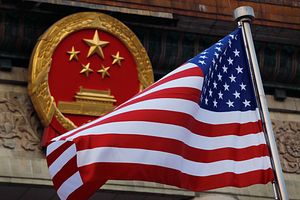On December 7, the U.S. State Department announced new sanctions on 14 top officials in China’s legislature for their role in “developing, adopting, or implementing” the national security law imposed on Hong Kong this summer.
“Beijing’s unrelenting assault against Hong Kong’s democratic processes has gutted its Legislative Council, rendering the body a rubber stamp devoid of meaningful opposition,” the State Department said in a statement. “One aspect of that assault has been the actions of the National People’s Congress Standing Committee (NPCSC), which have effectively neutered the ability of the people of Hong Kong to choose their elected representatives in keeping with the Joint Declaration and Basic Law.”
As Secretary of State Mike Pompeo vowed in a separate tweet, “We will hold Beijing accountable for destroying Hong Kong’s autonomy.”
The sanctions apply to the following individuals: Wang Chen, Cao Jianming, Zhang Chunxian, Shen Yueyue, Ji Bingxuan, Arken Imirbaki, Wan Exiang, Chen Zhu, Wang Dongming, Padma Choling, Ding Zhongli, Hao Mingjin, Cai Dafeng, and Wu Weihua. The 14 officials are vice chairs of the NPCSC, which unanimously adopted the national security law on June 30.
“These individuals and their immediate family members will be barred from travelling to the United States,” the State Department explained. “Their assets within the jurisdiction of the United States or in the possession or control of U.S. persons will be blocked and U.S. persons are generally prohibited from dealing with them.”
Many top Chinese officials send their children to school in the United States and/or have bank accounts or own real estate in the U.S. – practices that will not be allowed for these 14 individuals. Analysts have long recommended sanctions targeting specific individuals, arguing it could put real pressure on CCP members.
Indeed, the new sanctions clearly hit a nerve. China’s Foreign Ministry responded forcefully on December 8, with spokesperson Hua Chunying leading off the daily press briefing with a statement on the sanctions. “The Chinese government and people express strong indignation to and strongly condemn the outrageous, unscrupulous, crazy and vile act of the U.S. side,” Hua said, accusing the United States of “severely violat[ing] basic norms governing international relations.”
“Hong Kong is part of China, and its affairs are purely China’s internal affairs, and the United States is in no position to interfere,” she added. Hua promised that “China will take firm and strong countermeasures to defend its sovereignty, security and development interests” but did not provide specifics, despite prodding from a Bloomberg reporter.
The timing of the latest sanctions – coming a week before the Electoral College will officially vote to seal Joe Biden’s presidential victory – fits with analyst predictions that the lame-duck Trump administration is trying to rush through as many tough China policies as possible before leaving office on January 20, 2021. In the past week alone, besides the sanctions on NPCSC officials, the United States has designated China for “systematic, ongoing, egregious violations of religious freedom”; announced yet another arms sale to Taiwan; axed five cultural exchanges programs with China; slapped a visa ban on “individuals active in United Front Work Department”; and issued new visa restrictions for members of the Chinese Communist Party. It seems hardly a day passes without some new punitive policy targeting China being announced.
“[A]nti-China extremists in the United States, headed by Pompeo, have totally lost their minds in their unscrupulous political crackdown on China,” according to Hua.
The Chinese government, despite its decidedly bellicose rhetoric, has mostly refrained from taking action in kind – perhaps hoping to wait out the clock on the Trump administration and start things on better footing with the Biden team. Hua cited unnamed media outlets painting the anti-China drive as “last-day madness”: “They seek to consolidate their legacy of containing China and leave little wriggle room for the new administration to adjust it in the future.” Thus Hua limited her criticism to “some people in the United States,” “individual American politicians,” and “certain people in the US,” leaving the door cracked open for better relations under different leaders.
Of course, whether the Biden administration will take a markedly different approach is very much open for debate. We can expect more measured and diplomatic language, to be sure, but pressure for Biden to continue sanctions on China for its actions in Hong Kong (and Xinjiang and Tibet, for that matter) far outstrips calls for a full “reset” in U.S.-China relations. Any honeymoon period for Beijing is likely to be brief, and a result more of prioritizing the United States’ domestic issues than a starkly different view of U.S.-China relations.

































